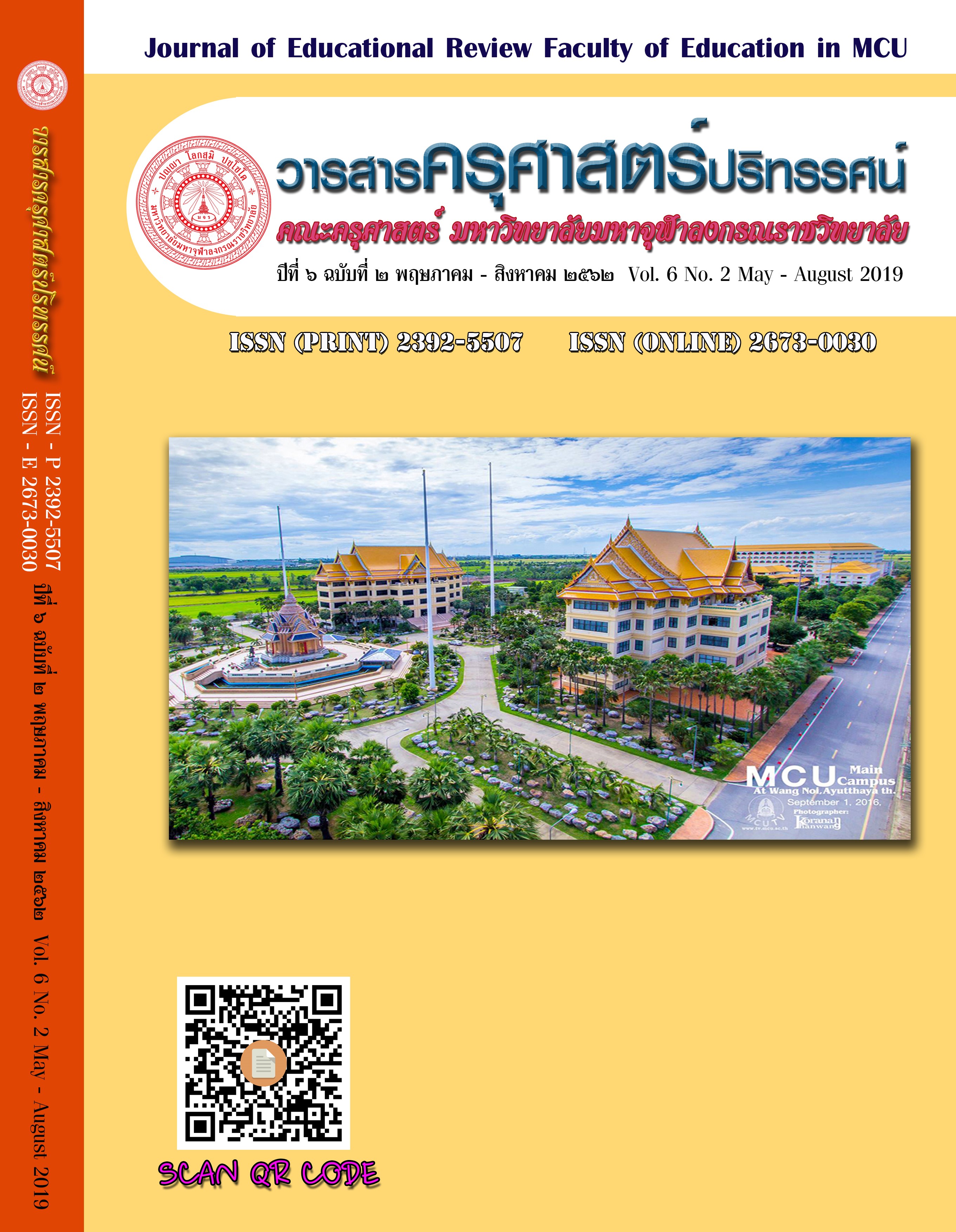Development of the Instructional Process of Project Based Learning for Enhancing the Learners in the 21st Century of Phrapariyattidhamma School, General Education Section, Bangkok
Main Article Content
Abstract
The project-based learning management was the basis for learning the subject description better than the learning method used in the lecture, which was a very deep learning process in the topic of learning according to the interests of individual learners or group learners. The main features of the project were to focus on the answers to the questions and practice activities to practice their skills in their own every step. The teachers provided the learning and used technology to assist in learning and project-based learning. The supporting factors and conditions of the Instructional Process of Project Based Learning consisted of 6 steps: basic knowledge, the stimulation of interest, the grouping of cooperation, the pursuit of knowledge, the conclusion of the study process, and the presentations and evaluations. For the grouping of the development of thinking process in a systematic and concrete consisted of 5 groups: basic thinking, rational thinking, creative thinking, holistic thinking, and 5 thinking for success. On the development of the learning and teaching process consisted of 5 aspects: focus on interdisciplinary learning in core subjects, creating a learning environment that focused on performance-based, creating Innovation, promoting the integration of learning resources and created an atmosphere both physical and mental, and the development of self-learning through planning and collaboration. Development of the Instructional Process of Project Based Learning for Enhancing the Learners in the 21st Century of Phrapariyattidhamma Schools, General Education Section, Bangkok, should start from the philosophy of education and vision by the philosophy of education and vision management of the school must be clearly defined and also the policy must be assigned in line with the educational philosophy and vision so that the teachers will plan the learning and teaching in accordance with the philosophy, vision and policy, and the curriculum and learning objectives according to standard and core curriculum indicators using teaching styles and teaching techniques that make the learners learn the most proactive.
Article Details
ทัศนะและความคิดเห็นที่ปรากฏในบทความในวารสารฉบับนี้ถือเป็นความรับผิดชอบของผู้เขียนบทความนั้นเพียงผู้เดียว และไม่ถือเป็นทัศนะและความรับผิดชอบของกองบรรณาธิการ
กองบรรณาธิการขอสงวนสิทธิ์ในการคัดเลือกบทความลงตีพิมพ์และจะแจ้งให้เจ้าของบทความทราบหลังจากผู้ประเมินบทความตรวจอ่านบทความแล้ว
ต้นฉบับที่ได้รับการตีพิมพ์ในวารสารครุศาสตร์ปริทรรศน์ คณะครุศาสตร์ มหาวิทยาลัยมหาจุฬาลงกรณราชวิทยาลัย ถือเป็นกรรมสิทธิ์ของคณะครุศาสตร์ มหาวิทยาลัยมหาจุฬาลงกรณราชวิทยาลัย ห้ามนำข้อความทั้งหมดหรือบางส่วนไปพิมพ์ซ้ำ เว้นเสียแต่ว่าจะได้รับอนุญาตจากมหาวิทยาลัยฯ เป็นลายลักษณ์อักษร
References
ทิศนา แขมมณี. (๒๕๔๗). ศาสตร์การสอน : องค์ความรู้เพื่อการจัดกระบวนการเรียนรู้ที่มีประสิทธิภาพ. พิมพ์ครั้งที่ ๓. กรุงเทพมหานคร : สำนักพิมพ์แห่งจุฬาลงกรณ์มหาวิทยาลัย.
เพชรรัตน์ หิรัญชาติ. (๒๕๕๔). การพัฒนารูปแบบการบริหารจัดการเรียนการสอนที่ส่งเสริมการใช้กระบวนการแก้ปัญหา ตามแนวทฤษฎีการรู้คิดในโรงเรียนประถมศึกษา สังกัดสำนักงานเขตพื้นที่การศึกษาประถมศึกษา กรุงเทพมหานคร. ปริญญาดุษฎีบัณฑิต สาขาวิชาการบริหารการศึกษา. บัณฑิตวิทยาลัย: มหาวิทยาลัยนอร์ทกรุงเทพ.
ไพฑูรย์ นันตะสุคนธ์ และวัลลภา อยู่ทอง. (๒๕๕๗). การจัดการเรียนรู้แบบโครงงานเป็นฐาน. กรุงเทพมหานคร: หน่วยศึกษานิเทศก์, สำนักงานคณะกรรมการการอาชีวศึกษา.
วิจารณ์ พานิช. (๒๕๕๕). วิถีสร้างการเรียนรู้เพื่อศิษย์ในศตวรรษที่ ๒๑. กรุงเทพมหานคร : มูลนิธิสดศรี-สฤษดิ์วงศ์.
สถาบันวิจัยเพื่อการพัฒนาประเทศไทย. (๒๔ ธันวาคม ๒๕๖๐). เป้าหมายของการเรียนรู้ในศตวรรษที่ ๒๑. แหล่งที่มา: www.tdri.or.th
สำนักแผนและประกันคุณภาพการศึกษา. แนวทางการดำเนินงานด้านการเรียนการสอนในศตวรรษที่ ๒๑. เอกสารอัดสำเนา.
Bender, W. N. (2012). Project-Based Learning: Differentiating Instruction for the 21st Century. California: Corwin a Sage Company.
Bloom Benjamin S., et al. (1965). Taxonomy of Educational Objectives. New York: David Mckay Company.
Thomas, John W. (2000). A Review of Research on Project- Based Learning. California: The Autodesk Foundation. Retrieved 6 September 2018, from https://www.bobpearlman.org


